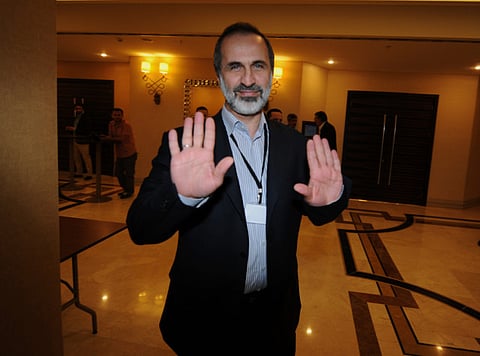Syrian opposition leader Al Khatib tells Al Assad to step down and leave
Plan offers them no legal immunity from prosecution

Beirut: A Syrian opposition leader urged President Bashar Al Assad on Thursday to hand power to his deputy or his prime minister and then go abroad with 500 members of his entourage, without immunity from prosecution.
Al Assad is likely to reject or ignore the 16-point peace plan proposed by Mu’ath Al Khatib, who resigned as head of the Western-backed opposition National Coalition in March, particularly given recent military gains by his forces against rebels.
However, Al Khatib’s proposal shows a willingness to work with people associated with Al Assad throughout the revolt and will be seen as stretching out a hand to members of the government.
It is unclear if Al Khatib’s proposal will win support from other Syrian opposition figures gathering in Istanbul on Thursday to decide how to respond to a US-Russian proposal to convene peace talks involving Al Assad’s government next month.
The Sunni Muslim cleric’s plan, posted on his Facebook page, calls on Al Assad to step down in favour of Prime Minister Wael Al Halki or Vice-President Farouq Al Shara, a veteran politician who has kept a low profile since the revolt began in March 2011, prompting opposition claims last year that he planned to defect.
Al Khatib said Al Assad should respond within 20 days and that he should then be given a month to dissolve parliament. Once Al Assad had ceded power, his government should stay in office for 100 days and restructure the military before handing over to a transitional government “which should be agreed upon and negotiated within the framework of international assurances”.
Al Khatib’s plan calls on the Syrian leader to leave the country with 500 of his chosen supporters, and their families, but offers them no legal immunity from prosecution.
The initiative also calls for the release of all political prisoners and opening Syria up to all types of humanitarian relief, something the government has tightly controlled.
Sign up for the Daily Briefing
Get the latest news and updates straight to your inbox



